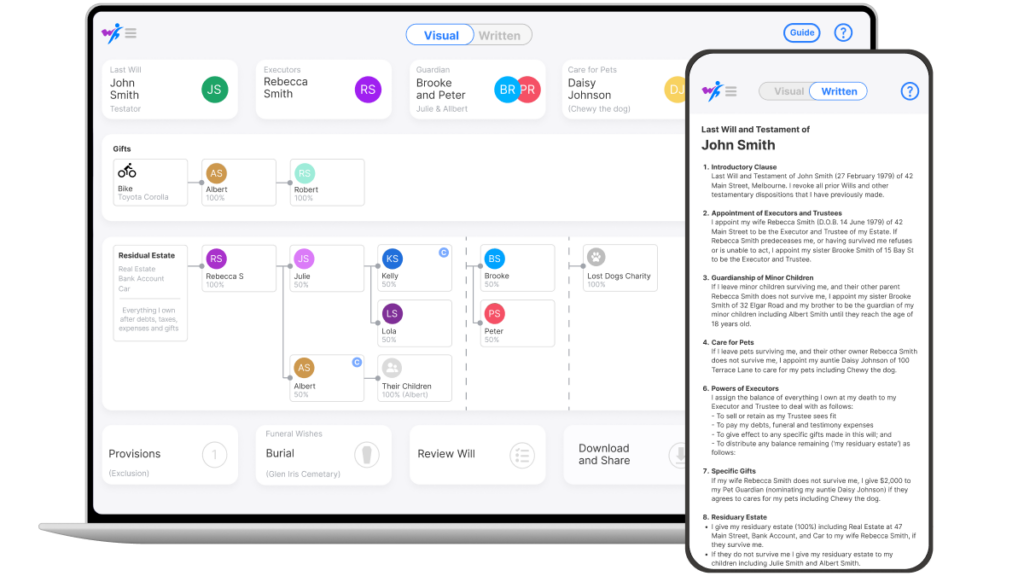
How To Make a Will in Tennessee
Step-By-Step Guide for creating a Last Will and Testament In Tennessee
Introduction: What is a Will?
A will is a legal document that outlines how your property and assets will be distributed after your death. It also allows you to make crucial decisions, such as naming guardians for minor children to ensure their care. Without a will, the state of Tennessee will decide how your estate is divided, which may not reflect your wishes. Creating a will allows you to control these important decisions and protect your loved ones.
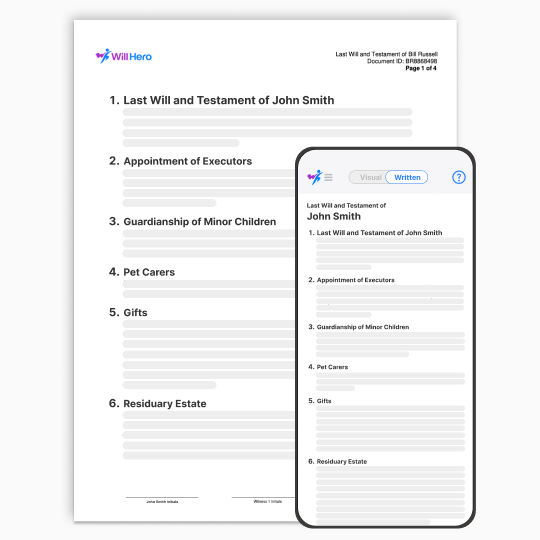
Laws for Creating a Will in Tennessee
When making a will in Tennessee, you must adhere to specific legal requirements. Failing to meet these criteria could result in your will being invalid, causing complications during probate. Below are the key legal requirements for creating a Will in Tennessee:

You must be at least 18 years old.

You must be of sound mind:
This means you understand what a Will is, what your assets are, and how you are distributing them.

The Will must be in writing and signed by you and two witnesses:
Handwritten (holographic) wills are valid if they are entirely in your handwriting. Oral wills are only valid in cases of imminent death and must be witnessed and documented soon after. Whether typed or handwritten, proper execution is required for the will to be legally binding in Tennessee.
By following Tennessee’s will laws, you can ensure your estate is distributed according to your wishes. If your will doesn’t meet these legal requirements, it could be contested or ruled invalid, leaving your estate’s distribution up to the court.
Step-by-Step:
How to Draft Your Will in Tennessee
1. Choose an Executor
Your executor is responsible for managing your estate and ensuring your will is carried out after your death. They will distribute your assets, settle any debts, and handle the legal steps required to close the estate.
When choosing an executor, select someone who is organized, trustworthy, and capable of managing these tasks. Many people choose a family member, close friend, or professional advisor.
It’s also wise to name a backup executor in case your first choice is unable or unwilling to serve.
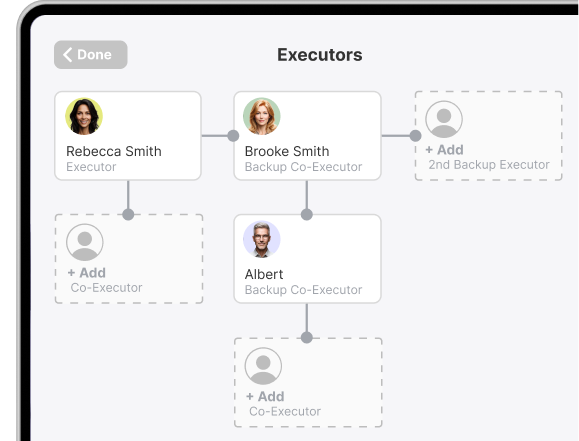
2. Name a Guardian for Minor Children
If you have minor children (or plan to), it’s essential to name a guardian to care for them in the event of your death. This guardian will make key decisions regarding their education, healthcare, and overall well-being.
Although optional, naming a guardian is crucial for parents. In Tennessee, if you don’t appoint one, the court will select a guardian, which may not align with your wishes.
It’s also wise to name a backup guardian in case your primary choice is unable or unwilling to serve.
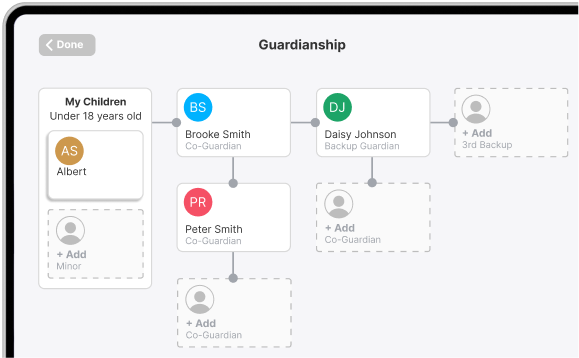
3. Name a Pet Carer
Tennessee law allows you to include provisions in your will for the care of your pets. You can designate someone to look after them and allocate resources for their upkeep, ensuring your pets are cared for after your passing.
While this step is optional, it’s an important consideration. If you don’t name a pet caregiver in Tennessee, your executor will assume responsibility for their care. By naming a specific person, you can ensure your pets are looked after according to your wishes.
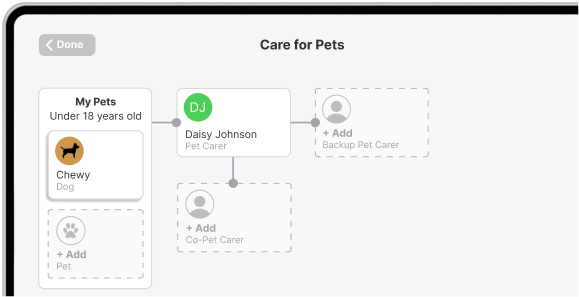
4. Decide who inherits your Residual Estate
The residuary estate is what remains after specific gifts and expenses have been distributed. You can designate one or more beneficiaries—such as family members, friends, or charitable organizations—to inherit these remaining assets. Be sure to clearly state their full legal names and specify the percentage or share each should receive. It’s also wise to name alternate beneficiaries in case your primary choices are unable or unwilling to accept the inheritance, ensuring a smooth and efficient distribution of your estate.

5. Gifting Specific Items
If you want to leave specific items—such as family heirlooms, jewelry, property, or cash—to someone, you can designate these in your will. Be as detailed as possible to prevent confusion or disputes later on. Including descriptions, appraisals, or serial numbers can provide clarity. It’s also a good idea to take an inventory of your assets before drafting your will to ensure nothing is missed or overlooked.

6. Any Additional Instructions or Provisions?
You can include optional instructions in your will, such as how you’d like your funeral conducted or directions to sell specific assets. You might also wish to make certain gifts conditional or set up a trust to hold funds until beneficiaries reach a particular age. These additional provisions help ensure your specific wishes are honored.

Review Your Will
Confirming Roles in Your Will
Before finalizing your will in Tennessee, it’s important to confirm with your chosen executors, guardians, and pet caregivers that they understand and are willing to accept these responsibilities. This ensures that each person is prepared and agrees to fulfill their role, reducing potential complications during the administration of your will.
It’s best practice to confirm both the primary and backup individuals nominated for these roles to ensure they are willing to take on the responsibility.

Executors
Guardians
Pet Carers
Test Your Will
Before finalizing your will, it’s important to carefully think through your wishes and plan for various potential scenarios, such as beneficiaries passing away before you or certain conditions not being met. This ensures that your estate is distributed according to your intentions, even in unforeseen circumstances.
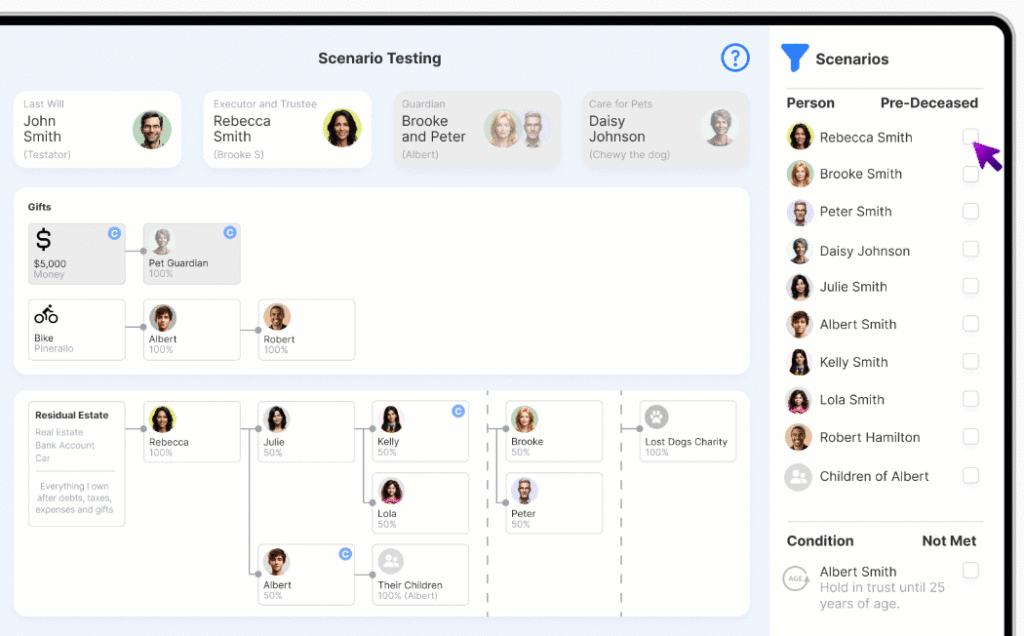
Signing Your Will
Signing Your Will In Front of Witnesses
Once your will is drafted, the next critical step is printing and signing it. In Tennessee, the signing process must meet specific legal requirements for the Will to be valid.
Witness Requirements
In Tennessee, to create a valid Will, you must sign the document in the presence of at least two witnesses. These witnesses must:
- Be at least 18 years old.
- Understand that they are witnessing the signing of your will.
- Both witnesses must sign the will after you have signed it, attesting that they were present and that you appeared to be of sound mind when signing.
Note: Witnesses can be named as beneficiaries in Tennessee, but this may lead to disputes, so its generally recommended to select disinterested witnesses.
Witnesses vs Notaries
A will doesn’t need to be notarized to be valid in Tennessee, but a self-proving affidavit (notarized) can speed up probate by eliminating the need for witnesses to testify.
Storing Your Will
Keep Your Will Safe
After your will is signed and witnessed, it’s vital to store the original document securely. In Tennessee, only the original signed copy is legally binding—not a digital version. Losing or damaging it can cause complications and delay the distribution of your estate.
Here are some options for securely storing your will:
Store at Home
Best practice is to use a fireproof safe and ensure your executor knows its location.
With an Attorney
Many attorneys provide secure storage for original wills.
Trusted Person
You can entrust your will to a reliable family member or friend.
Although you may store digital copies for reference, only the original signed will is legally valid. Ensure your executor knows where to find it to avoid legal issues.
FAQs: Making A Will in Tennessee
1. What Are My Options for Making a Will in Tennessee?
In Tennessee, there are several ways to create a will:
Hiring a Lawyer: Ideal for complex estates or when you need personalized legal advice. Attorneys can assist with estate tax planning, trusts, and other specialized needs.
Using an Online Platform: For straightforward estates, platforms like Will Hero offer an affordable, guided process for creating a legally valid will.
Handwritten Will: Tennessee allows handwritten wills (holographic wills) as long as they are entirely in your handwriting and signed by you. Witnesses are not required for holographic wills, but they may be more easily contested.
2. Do I Need a Lawyer to Make a Will in Tennessee?
No, you don’t need a lawyer to create a valid will in Tennessee. For simple estates with clear instructions, you can use an online platform or draft a handwritten will. However, for more complex estates or if you have concerns about tax planning or trusts, seeking legal advice from an attorney can help ensure your will is comprehensive and legally sound.
3. Are Handwritten (Holographic) Wills Valid in Tennessee?
Yes, handwritten (holographic) wills are valid in Tennessee. To be legally binding, a holographic will must be written entirely in the testator’s handwriting and signed by them. Unlike typed wills, holographic wills do not require witnesses, but they can be more easily contested in court, especially if the handwriting is unclear or if there is any dispute regarding its authenticity. It’s generally recommended to ensure clarity when drafting a handwritten will in Tennessee.
4. How Much Is the Inheritance Tax in Tennessee?
No, Tennessee does not impose an inheritance tax. In fact, Tennessee repealed its inheritance tax in 2016. However, federal estate tax may still apply if the estate exceeds the federal exemption threshold, which is $12.92 million (as of 2023). For estates under this amount, no federal estate tax is due. It’s always a good idea to consult with a tax professional or attorney to ensure compliance with tax laws, especially for larger estates.
5. Do I Need to Notarize My Will in Tennessee?
No, Tennessee does not require wills to be notarized to be legally valid. However, you must have at least two witnesses present when you sign your will, and they must also sign it. Notarizing your will can create a “self-proving” document, which may expedite the probate process by eliminating the need for witness testimony. While notarization is beneficial, it is not a legal requirement in Tennessee.
6. Can I Change My Will After It’s Signed?
Yes, you can change or update your will at any time, as long as you are of sound mind. There are two main ways to do this:
- Add a Codicil: A codicil is a legal amendment to your existing will, and it must be signed and witnessed like the original.
- Create a New Will: Draft a new will that explicitly revokes all prior wills and codicils. Be sure to destroy any old copies to avoid confusion or disputes.
7. What Happens if I die without a Will?
If you die without a will in Tennessee, your estate will be distributed according to the state’s intestate succession laws. This means your assets will go to your closest legal relatives as determined by law. If no close relatives are found, the state may claim your property. Additionally, if you have minor children, the court will appoint a guardian, which may not align with your preferences. Having a will allows you to control these important decisions yourself.
8. What is Probate?
Probate is the legal process of ensuring a deceased person’s will is valid and their estate is properly distributed. If there is no will, Tennessee’s intestate succession laws apply.
In Tennessee, probate typically follows these steps:
- Filing the Will: File the will with the probate court in the county where the deceased lived.
- Appointing an Executor: If none is named, the court appoints one.
- Inventorying Assets: The executor lists and values assets.
- Paying Debts and Taxes: All outstanding obligations are paid.
- Distributing Assets: Remaining assets are distributed.
- Small Estate Procedure: Estates under $50,000 can use a simplified process.
- Closing the Estate: File a petition to close the probate process.
Tennessee’s Small Estate Procedure for estates valued under $50,000 offers a simplified process known as a “small estate affidavit” to avoid full probate.
9. How Long Does Probate Take?
The probate process in Tennessee typically takes 6 to 12 months for uncomplicated estates. The timeline can extend to over a year if the estate is complex, there are disputes among beneficiaries, or the will is contested. Factors like asset valuation, debt settlement, and tax obligations can also affect the length of the process. For smaller estates under $50,000, the small estate procedure may expedite the process.
10. Can Probate Be Avoided?
Some assets can bypass probate through:
- Joint ownership with right of survivorship: Property held in joint tenancy automatically passes to the surviving owner.
- Beneficiary designations: Assets like life insurance policies, retirement accounts, and payable-on-death accounts avoid probate if beneficiaries are named.
- Living trusts: Transferring assets to a living trust allows them to pass directly to beneficiaries without probate. Ensure assets, such as real estate and bank accounts, are properly moved into the trust to benefit from this.
These strategies help streamline the estate process and avoid probate delays.
Ready to Start your Will?
For many, getting started is the hardest part. Will Hero makes it easy by offering a free, visual way to draft your will, understand your wishes, and learn about estate planning with the help of guides and an AI Assistant. You can even test your will under various scenarios using Scenario Testing. An upgrade is only required when you’re ready to finalize the written document. Will Hero is on a mission to make will creation more visual, interactive, and even enjoyable.
Start today and protect your loved ones and legacy!
